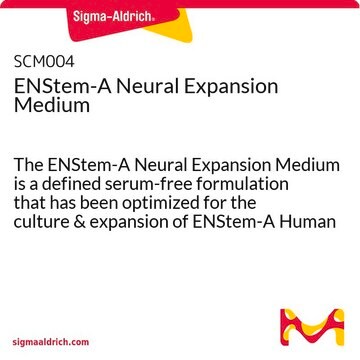SCR022
Adult Rat Hippocampal Neural Stem Cells
Adult Rat Hippocampal Neural Stem Cells are self-renewing cells with the capacity to differentiate into neurons, astrocytes & oligodendrocytes.
Synonym(s):
Rat Neural Stem Cells
About This Item
Recommended Products
biological source
rat
Quality Level
manufacturer/tradename
Chemicon®
technique(s)
cell culture | stem cell: suitable
input
sample type neural stem cell(s)
shipped in
liquid nitrogen
General description
Introduction:
Neural stem cells (NSC) are self-renewing cells with the capacity to differentiate into neurons, astrocytes and oligodendrocytes. Adult NSC are extremely rare and are believed to reside only in discrete regions of the hippocampus and the subventricular zone. Due to their therapeutic promise, considerable attention has been focused on identifying the sources of stem cells, the signals that regulate their proliferation and the specification of neural stem cells towards more differentiated cell lineages (Gage, 2000).
Presently, neural stem cells are often identified based upon the presence of molecular markers that are correlated with the stem and/or progenitor state along with the absence of differentiated phenotypes as assessed through marker analysis. To aid researchers in the accurate identification and characterization of neural stem cells, Millipore presents cryopreserved Adult Rat Hippocampal Neural Stem Cells (Catalog No. SCR022).
Millipore′s Cryopreserved Adult Rat Hippocampal Neural Stem Cells provides ready-to use primary neural stem cells isolated from the hippocampus of adult Fisher 344 rats. These primary cells may be used for a variety of research applications including drug development, for studies of neurotoxicity, neurogenesis, electrophysiology, neurotransmitter and receptor functions and CNS diseases and disorders.
We recommend that Millipore′s Cryopreserved Adult Rat Hippocampal Neural Stem Cells (Catalog No. SCR022) be used in conjunction with the Neural Stem Cell Marker Characterization Kit (Catalog No. SCR019) and differentiation assays that demonstrate multipotentiality of the starting cell population. Please look for these differentiation assays from CHEMICON in the near future.
For Research Use Only; not for use in diagnostic procedure.
Cell Line Description
Application
Stem Cell Research
Packaging
Components
Storage and Stability
Legal Information
Disclaimer
Storage Class Code
10 - Combustible liquids
WGK
WGK 1
Flash Point(F)
212.0 °F
Flash Point(C)
100 °C
Certificates of Analysis (COA)
Search for Certificates of Analysis (COA) by entering the products Lot/Batch Number. Lot and Batch Numbers can be found on a product’s label following the words ‘Lot’ or ‘Batch’.
Already Own This Product?
Find documentation for the products that you have recently purchased in the Document Library.
Articles
Frequently asked questions about neural stem cells including NSC derivation, expansion and differentiation.
Protocols
Step-by-step culture protocols for neural stem cell culture including NSC isolation, expansion, differentiation and characterization.
Our team of scientists has experience in all areas of research including Life Science, Material Science, Chemical Synthesis, Chromatography, Analytical and many others.
Contact Technical Service







